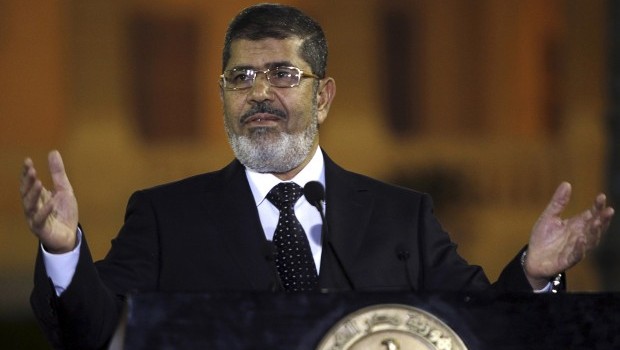The Egyptian opposition demonstrations passed without major incidents so far. President Mursi—and the Muslim Brotherhood behind him—continues to refuse to withdraw the decrees that have granted him unrestricted constitutional powers. Meanwhile, the Brotherhood and their Salafi allies have warned that they will not sacrifice all they have achieved in terms of political gains, in light of limited international criticism of the Brotherhood’s moves. This power grab scenario could in fact be a way of testing the equation “Egypt in exchange for peace”, as more than one observer has pointed out, in reference to the praise that Mursi received from the US President Barack Obama and Israeli officials for his role in the ceasefire negotiations between Israel and Hamas.
However, what President Mursi did was nothing new. Every Egyptian President since 1952 has sought to assume more power, and to open the way for their organization or party to seize the state apparatus.
In order to understand what is really happening, it is best to return to recent history. In an interview conducted by the late President Anwar Sadat with the journalist Ali Amin, he emphasized the need to distinguish between the “Arab Socialist Union” (ASU) and official state organs to eliminate any duplication in governance. Here Sadat drew attention to the fact that the ASU was suffering from a tendency to seize the decision-making apparatus in the country (Al-Ahram newspaper, 12 April 1974).
The ASU was effectively the ruling party, despite parties being outlawed during the Naserrite era, and it played the role of a secret organization, a political party, and a state at the same time. There was, without doubt, a contradiction between the concept of the state—concerned with national interests—and the Arab nationalist organization and party, which saw the state as a mere tool to be used in the wider and more comprehensive regional project. In truth, Sadat was planning to eliminate the ASU, because he saw in it a revolutionary political legacy that was incompatible with his political project. He also saw its leading figures as rivals and saboteurs, capable of thwarting his attempts to take Egypt out of its military and economic crisis, and especially his plan to sever ties with the Soviet Union.
The performance of the Egyptian army in the October War gave President Sadat popularity on the street, and an opportunity to issue the call to remedy the ASU’s under the pretext of developing it, and soon he began the battle to dissolve the union completely in 1978. In this endeavor Sadat relied on his international success and American and European support for his policies, especially his project for peace with Israel. However, the crisis mushroomed and with it the arrest list began to expand, including many opponents of the regime from the Muslim Brotherhood and the Egyptian left. Western newspapers criticized the president’s stances and his “dictatorial” decisions, but Sadat argued that his decisions and powers were temporary and necessary to cleanse the state’s institutions of the old guard of the former regime.
Of course, Sadat ended up being assassinated, and shortly after his death the Brotherhood, the left and even the Nasserites cheered the arrival of President Mubarak, who they saw as a savior from the past. Mubarak released prisoners, a move welcomed by his opponents, but it was not long before he enacted emergency laws and issued presidential decrees. Mubarak defended his decrees by claiming they were temporary and necessary to restore stability to Egypt. Don’t these chapters in Egypt’s history bring to mind what is happening in Tahrir Square over the last few days? Here the Brotherhood are trying to eliminate their former partners in the “revolution”, and are removing independent and opposition figures from state organs, such as the judiciary and the security apparatus, calling for these institutions to be cleansed of “remnants”. It is surprising that the Brotherhood has adopted this path so quickly, for less than six months after Mursi’s election the new president has been able to gain control of the army establishment and the judiciary, and has pursued opponents abroad, like Ahmed Shafik and Murad Muwafi.
In my opinion the problem is not confined to the president seizing power with a constitutional declaration on a temporary basis—as he says—but rather because the president, with the support of the Brotherhood, is determined to merge the state organs on the one hand, and the Freedom and Justice Party and the wider Brotherhood organization, represented by the General Guide and members of the Guidance Bureau, on the other. In other words, he is seeking to create a one-party state.
The Baathists in Syria used to say they were not the state; rather they were a pan-Arab organization representing the Arabs as a whole, not Syria alone. However, the truth is that they abolished the state in favor of their organization. There is no doubt that the Brotherhood in Egypt, and those who sympathize with it abroad, feel severely restricted and defensive, and therefore all their responses and comments accuse their opponents of hostility towards Islam. However, nothing can hide the reality that the Brotherhood aims to shape the constitution to their design, to exclude their opponents from power, and to fill the vacant seats with loyalists.
There are those who say that Mursi’s decisions may bring about the birth of a united opposition, and this is true, but we must remember that oppositions of this kind are slow to form, but quick to disintegrate and divide. President Mursi is facing a major challenge to prove the good intentions of his government and its independence from the Brotherhood, and this will only be achieved if he retracts his decrees, or if the Brotherhood transforms completely into a political party that can be held to account for its policies. In other words, the concept of the civil state must prevail or the Brotherhood will attempt to swallow the state, which it is incapable of digesting.
